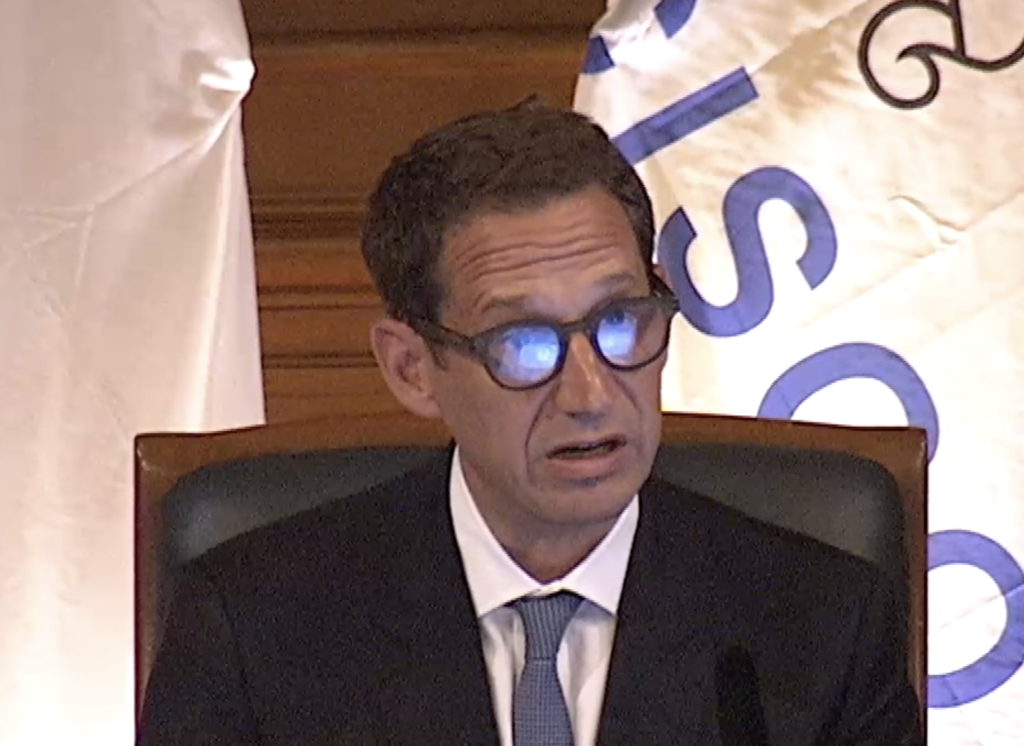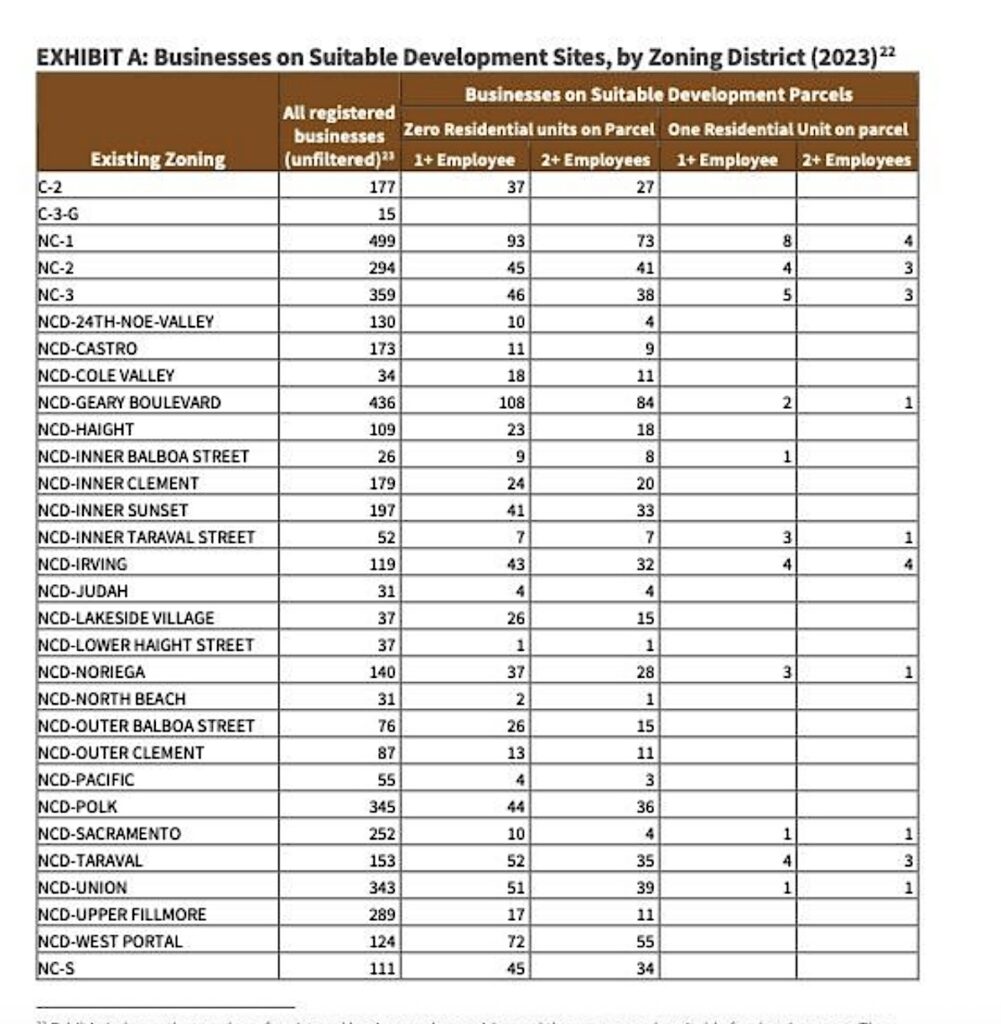Almost a third of all the small businesses in the city’s neighborhood commercial districts could face displacement under Mayor Daniel Lurie’s plan to allow more and denser housing in neighborhoods, data from the City Planning Department shows.
In some neighborhoods—the Geary corridor, for example—nearly half the small local merchants are endangered, the data shows.
That’s because the so-called “family housing” plan would encourage developers to demolish small buildings to put up larger ones—and many of those small buildings have small commercial tenants.

City planners tell me that they will discourage the demolition of existing rent-controlled housing (although a bill by Sen. Scott Wiener would encourage that practice.)

But 1,769 small businesses are in vulnerable places (sites that are prime for new development where there are no existing residential units)—and 47 are officially recognized “legacy businesses.”
As the planning report notes:
In addition to the site-specific conditions that make a parcel more susceptible, there may be characteristics of the businesses themselves that place them at greater risk of displacement. Small businesses that rent and do not own their spaces face heightened vulnerability to displacement. Further, businesses owned by people-of-color (POC) experience pre-existing systemic inequities such as challenges accessing capital to start a business or negotiating leasing terms in their spoken language. This is especially significant given that the rezoning proposal includes commercial corridors that are known cultural anchors. Immigrant communities, such as the historic Chinese and Russian enclaves in the Sunset and Richmond districts, may have moved to these neighborhoods at a time when they were more affordable and accessible to working-class people and first-time home buyers. Furthermore, in addition to having lower owner- occupancy, another finding … was that food and beverage businesses also have a higher representation of POC-ownership. These factors mean that POC-owned businesses might be more vulnerable to displacement or closure.
This would have a profound and lasting impact on the city’s neighborhoods. As Peter Stevens, director of policy and research for Build Affordable Faster California, notes:
The greatest danger to these neighborhoods’ economic vitality and quality of life is posed by real estate speculators, who will pay much higher prices for these ‘suitable’ properties—based on their newly upzoned development potential—than current small business commercial rents would justify. As a result, they will increase those current businesses’ rents and refuse to extend their leases, often forcing their closure or displacement.
The Small Business Commission will hold a hearing on the issue Monday/28. That meeting starts at 4:30 in City Hall Room 400.
I was talking to former Sup and state Assemblymember Tom Ammiano this weekend, and he reminded me that Harvey Milk always warned that vulnerable groups have to remain vigilant, even when they’ve won victories. “I doesn’t always last,” Ammiano told me.
Ten years ago, a lot of people thought reproductive rights were safe in the US: Roe v. Wade was the law of the land, and even Supreme Court candidates like Brett Kavanugh said in confirmation hearings that Roe was “settled law.” We won that battle—or, we thought we did.
Now Sup. Matt Dorsey is looking at repealing the city’s landmark Equal Benefits Ordinance, which requires city contractors to offer the same benefits to LGBTQ+ domestic partners that they offer to married couples. The law had an immediate impact, causing some major corporations (including United Airlines) to start giving domestic partners health insurance.
With the country marking the 10th anniversary of same-sex couples having the right to wed, and domestic partnerships largely anachronistic, Dorsey is questioning the need for city officials’ continued implementation of the law.
Dorsey, in two phone conversations with the Bay Area Reporter in recent days, insists that the city’s contracting process has become too onerous and that the city is spending too much money on contract compliance for things like the EBO.
But the Supreme Court decision legalizing same-sex marriage is by no means safe. Justice Clarence Thomas, in his opinion undoing Roe, specifically noted that the court might now need to reconsider decisions like Obergefell v. Hodge.
Ammiano told me that it makes no sense to repeal this measure, which frankly isn’t all the onerous: Companies bidding on city contracts just need to check a box, and small companies that can’t afford generous benefits for their straight married workers don’t have to offer them to domestic partners.
“Plus, for a lot of seniors, domestic partnership sometimes makes more sense for financial reasons,” Ammiano, who sponsored the ordinance and got it approved after a tough battle, told me.
Sup. Rafael Mandelman has already tried to streamline city contracting, and one of his suggestions, that the city law banning purchases of clothing made in sweatshops, ran into strong labor opposition. The anti-sweatshop ordinance, among the first in the country, was a huge victory for organized labor, and even if the immediate impact of Mandelman’s changes wouldn’t be dramatic, the message it sends would.
Scotty Jacobs, who is making a nice six-figure salary as the director of the newly named but some-old astroturf group Blueprint, is mad at the Coalition on Homelessness for suing the city over abuses in clearing homeless encampments. He’s calling the coalition
another grifting organization amidst the constellation of orgs that feed off our city’s bloated budgets
He says the coalition “walked off with $2.8 million in taxpayer money.” But he didn’t check the facts: The Coalition on Housing got none of that money. The settlement requires the city to pay $11,000 each to two unhoused people who lost all their belongings in sweeps; the rest of the money went to attorney’s fees.
As Chrstin Evans, a member of the city’s Homeless Oversight Commission, asks:
Hey Scotty, who are the grifters here? The head of the latest billionaire funded PAC? Or the non profit workers who make a fraction of his paycheck helping our city’s most vulnerable?
Jacobs makes the same old tired, inaccurate argument that advocates for the unhoused oppose shelter and want “free housing for life” for anyone on the streets. Actually, most people who have spent any time studying the data (as Evans has) know that only 13 percent of people in city shelters end up in permanent housing, and nearly everyone in permanent supportive housing stays off the streets. That housing isn’t “free” at all; people pay rent equivalent to a third of their income, which is what the federal government says rent should be.
Meanwhile, in the world of billionaire grifters, Elon Musk has announced that Tesla will begin offering robocab rides in San Francisco this week—even though the company has no permits or license to operate a taxi service or run robocars—and a similar experiment in Austin isn’t working out so well.
“Tesla’s robotaxi scheme isn’t just reckless, it’s illegal,” said Tesla Takedown, an activist group. “Operating autonomous vehicles without proper approval in California puts everyone at risk. With revenue and deliveries falling, regulatory scrutiny rising, and Tesla’s last lifeline— billions in government credits—on the line, Tesla is running out of road. The robotaxi dream is a legal liability, not a business model.”
This will be a huge test for Mayor Daniel Lurie.
When Uber and Lyft began offering illegal taxi rides in San Francisco, then-Mayor Ed Lee told his regulators to leave them alone. I spoke to one of the people responsible for overseeing the taxi rules at the time; she was furious. These companies had no cab permits, no legal right to transport passengers—and the mayor was so enamored of tech companies that he allowed them to break the law with impunity.
That same pattern, of course, happened with Airbnb.
This emboldened tech oligarchs all over to ignore the law, do whatever they want, and try to get permission later.
Musk is following that that pattern, and if the mayor has any political backbone, he will order the police to stop these illegal vehicles and impound them.
Or he will just look the other way, and let Musk get away with it.




